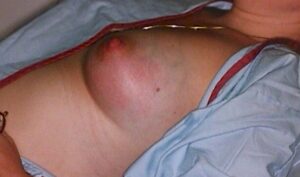During lactation, breast infections (mastitis) are common. They are usually caused by common skin bacteria (particularly staphylococcus) being introduced into the ductal system through cracked nipples and the inoculation by the newborn suckling. Maternal fatigue, stress, age >30, and history of previous breast infections are predisposing factors.
Clinically, these patients present with a rapid onset of unilateral breast tenderness, redness, fever, and sometimes a thickening or mass.

Breast infections can be very aggressive with high fevers developing quickly. Immediate treatment is important to keep an otherwise simple mastitis from developing an abscess, requiring surgical drainage.
Good treatments include:
- Dicloxacillin 250 mg PO QID x 7 days
- Oxacillin 250 mg PO QID x 7 days
- Erythromycin 250 mg PO QID x 7 days
- Azithromycin 1 gm, 2 PO, then 1 PO QD
- 1st Generation cephalosporin
- Clindamycin 300 mg PO TID x 7 days
- Vancomycin
Continue to breast feed from the affected breast as drainage is important.
Recurrent infections are common.
